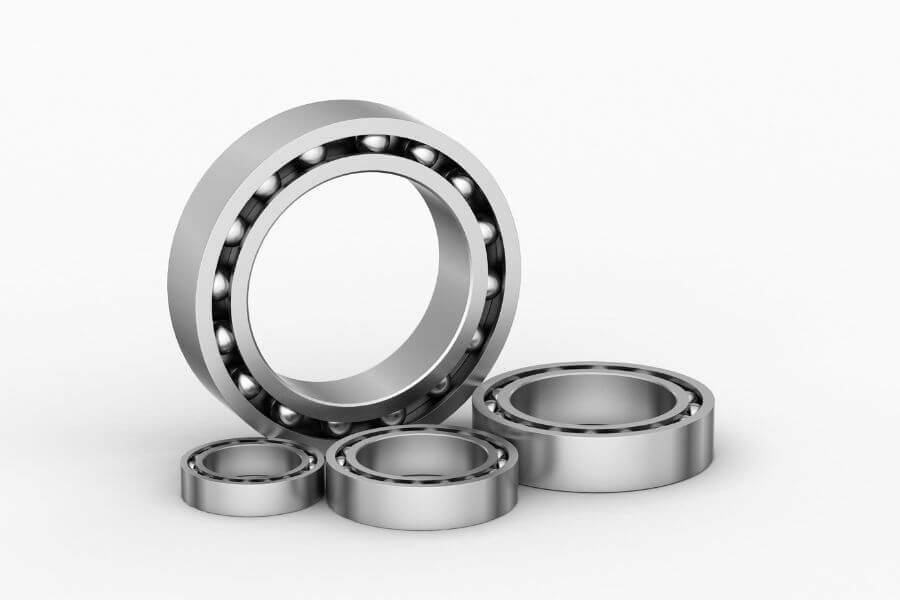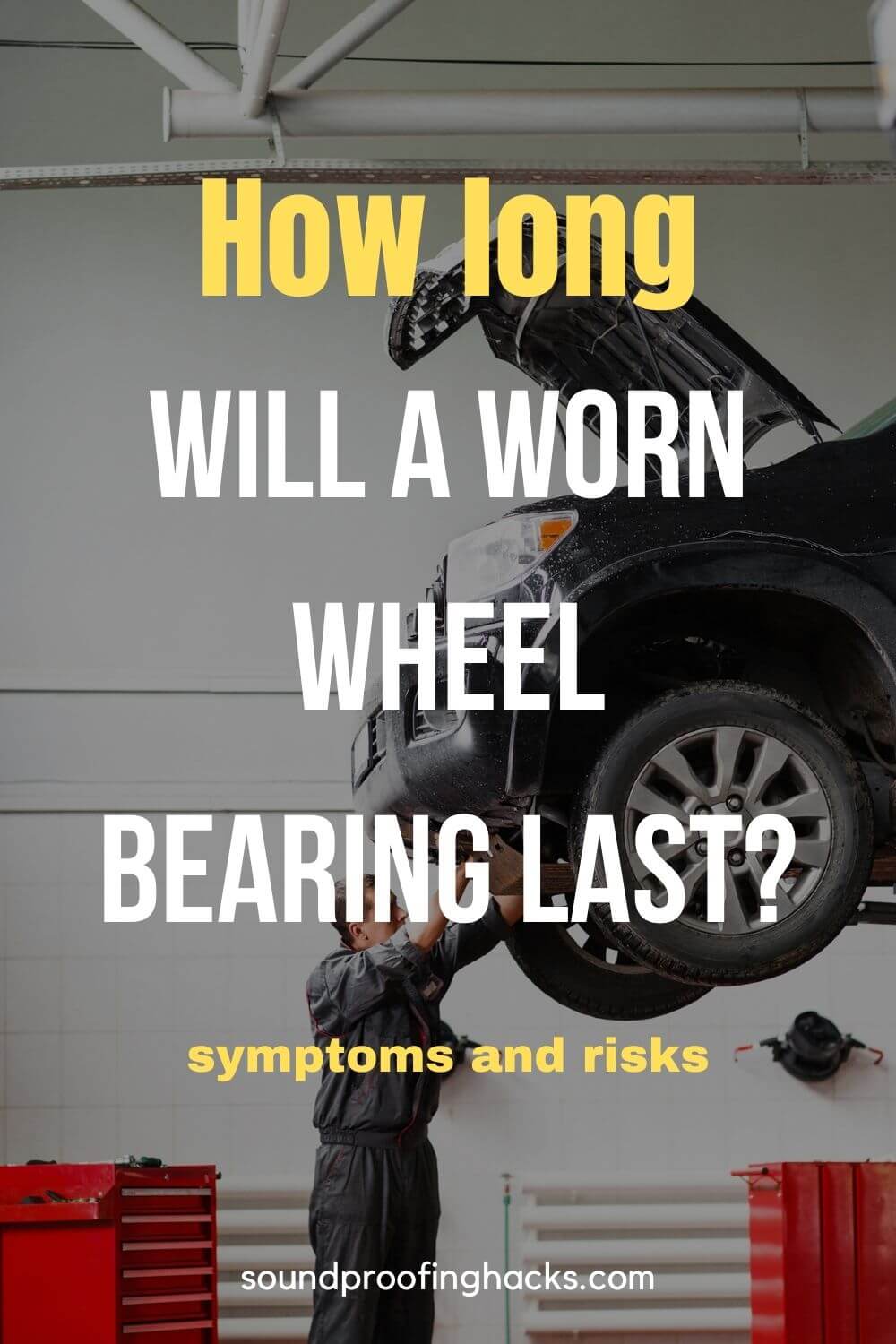How long will a worn wheel bearing last?
It is an unmistakeable sound of metal screeching, and you sometimes feel like you cannot control where the car is going. Sounds like a problem coming from the wheel bearings. But how long will a worn wheel bearing last?
At the first sign of trouble, you should send it to a mechanic for inspection immediately. If that is not readily available, you should not drive more than 1,000 miles when your wheel bearings are worn. The vehicle is no longer operating as it should and this can lead to serious damage or worse, an accident. Keep the speed low, not exceeding 40 mph, and head straight to a professional mechanic.
Read on to find out how to detect worn wheel bearings and the risks associated with it.
I am an Affiliate for Amazon and others, which means I may make a commission if you purchase something through the links here. There is NO extra cost to you at all, and THANK YOU so much for the support. Learn more here.
Contents: Skip to section
What is a wheel bearing? What does it do?

A wheel bearing is a part of the wheel assembly which connects the wheel and the axle. Its job is to allow the wheels to rotate seamlessly with as little friction as possible. As they play an important safety aspect to your vehicle, it is crucial to keep them in good condition and take actions when it stops functioning as it should.
Without them, loads caused by gravitational forces when cornering, braking and regular driving will not be able to be sustained.
They are essentially steel balls that are held together by a metal ring.
How long does a wheel bearing last?
With regular driving, a set of wheel ball bearings will last somewhere between 75,000 to 100,000 miles, or 120,700 to 160,934 km. This is just a general guideline, and it depends on the quality as well as how you drive the car.
If you drive frequently in the city with lots of starts and stops and turns, you would expect the lifespan of ball bearings to be lesser. The same goes if you take your car off road.
You should always pay attention and look out for symptoms of a failing ball bearing as you get closer to the numbers above.
Some manufacturers or even mechanics might tell you that they last a lifetime, but I find that that is hardly ever the case.
Types of car ball bearings
Across all types of vehicles, you can find one of these four types of wheel bearings:
1. Ball bearings
These are the most common as well as being the most versatile, and they are designed to withstand radial and thrust loads pretty well. Radial loads refer to the pressure exerted on the wheels, while thrust loads refer to the pressure when cornering.
2. Roller bearings
These are also commonly used, but not so much in vehicles. They do not handle thrust loads well, and thus cannot be relied on to tackle turns and cornerings. They are more commonly found in trolleys.
3. Tapered roller bearings
These type of wheel bearings are commonly used for trucks and cars. As you can imagine, they are tapered on one end like a cone to further reduce the amount of friction caused when cornering a vehicle. This is very useful in preventing metal parts from grinding against each other.
4. Precision ball bearings
As the name suggests, these type of wheel bearings are made with high precision and are designed with withstand large amounts of pressure. Because of the way they are made, they effectively reduce friction and thus do not generate as much heat and allows for higher performance. You would tend to find them in racing cars and airplanes.
Why do ball bearings fail?
There are a number of reasons why wheel bearings fail, even though some claim that they can last a lifetime. Let’s look at some of the causes.
1. Lack of lubrication
This is the smallest of your problem and can be resolved pretty quickly. If your vehicle’s wheel bearings are not well lubricated, the inner and outer bearing can rub against each other and cause a squeaking noise. You can opt to do it yourself or visit a mechanic. This can set you back about $150, but well worth it to ensure a smooth ride and longevity of your vehicle.
2. Faulty installation
In most new vehicles, this is quite unlikely to happen, but it is not uncommon when dealing with used cars which have seen their wheel bearings being changed before.
During installation, the use of wrong tools such as hammers can cause structural damage to both the interior and the exterior of the wheel bearings.
Sometimes, old parts such as screws, buts, and bolts are being reused, which could lead to incompatibility and cause increased wear and tear while driving. This will quickly turn into a damaged wheel bearing and might cause accidents to happen.
3. Road quality
If you frequently drive through rough road conditions, the wheel bearings will take a lot of unnecessary damage and shock. Common mistakes include driving over potholes, onto curbs, or driving too fast over speed bumps, all of which will cause damage.
4. Poor quality of wheel bearings
You can imagine that a set of wheel bearings have to go through lots of pressure each and every time you drive. If they are not designed properly to handle factors such as high heat, vibrations, and shocks, they are bound to give way sooner rather than later.
Poorly made wheel bearings are often made using low quality materials, and not heat treated, leading to early wear and tear.
5. Driving conditions
If your vehicle has to go through unusual road conditions such as gravel, sand, mud, or deep water, all these can have a big impact on the health of the wheel bearings.
Small particles or moisture can get trapped or worse, see past the seal and enter the wheel bearings, leading to premature wear and tear.
6. Modifications to your car
It is not uncommon to make some modifications to your car from time to time. These can include things like tires with lower thread counts, wider rims, stiffer shock absorbers, which can increase the amount of pressure exerted on wheel bearings.
Not surprisingly, all these forces will cause the wheel bearings to deteriorate much quicker than usual. It is advised to adhere to the recommendations made by the car manufacturer.
7. Minor accidents
Many of us choose to ignore very minor accidents, preferring to either fix the problem ourselves or delay it till the next major servicing. However, this minor incident could have caused a dent or misalignment in the wheel bearings, which makes it unable to function normally.
Over time, the increased friction will cause higher amounts of wear and tear, eventually damaging them. If you had a small accident that might have impacted the wheel area, it is better to send your car in for a checkup.
How to detect a failing ball bearing? Symptoms of bad ball bearings
You will first need to figure out if what you are experiencing is coming from a fault set of wheel bearings. Sometimes, it can be mistaken or confused with your brake pads getting worn out, which makes a sharp high pitched noise but stops when you apply the brakes.
The following are common scenarios to tell when wheel bearings are becoming faulty. If you are experiencing more than one symptom, that is a sign of some serious damage.
Loud or strange noises
One of the most obvious symptoms of a worn wheel bearing is when you can hear noises when you are turning your vehicle. This noise can range from soft to loud, depending on the severity of the damage, and is most often described as humming, clicking, snapping, or knocking.
Additionally, these noises can also sometimes be heard when you are accelerating, braking, or changing gears.
I suggest that you test this out on a quiet area where you drive at a slow pace of less than 40 mph, and perform some left and right turns. In this setting, you should be able to hear the noise clearly. If it is present, your wheel bearings are most likely damaged and you should head to the workshop right away.
Grinding
The sound of metal grinding against metal is never a good thing to hear when driving. This can indicate a serious mechanical problem and cause danger to the driver, passengers, and other road users too.
This sound becomes more noticeable when you pick up speed, and is a very serious problem you cannot ignore. The mechanic’s workshop should be your only destination at this point.
Steering wheel vibration
Steering wheels are not meant to vibrate, and when it happens, one of the most common causes is due to a faulty wheel bearing. When the seal of the wheel bearing gets broken or damage, it can lead to steering wheel vibrations. This is more evident when you drive faster.
As contaminants and foreign objects seep into the inner ring of the wheel bearings, it creates friction and causes it to stop working normally.
Pulling when applying brakes
A normal vehicle will stop straight when you apply the brakes, but in the case of a broken wheel bearing, this may cause the vehicle to sway and pull to one side. Your wheel bearings are likely very damaged at this point and you should no longer drive the vehicle anywhere except to a mechanic.
Failing ABS
ABS, or Anti-lock braking system, is a system that prevents your wheels from locking up when you apply your brakes. This allows the driver to have better steering control while trying to stop a vehicle.
If you realize that your vehicle’s ABS is no longer working, this can be a sign of damaged wheel bearings. As the ABS sensor is integrated with the wheel bearings, damage caused to it will likely affect the sensor too, rendering them ineffective.
Needless to say, this is also a very serious condition, and you should avoid driving the car further.
Risks of worn wheel bearings
There are obvious risks to driving around with bad wheel bearings, but some might not be as clear to you from the get go. Understand the risks you face if you decide to drive around with wheel bearings that are faulty.

Safety
This should be the number one consideration for any driver facing this problem. Wheel bearings can become damaged in a number of ways, and each of them can cause your vehicle to sway unnaturally, lock up your breaks, or even lock up your wheels.
Losing control of your vehicle can lead to serious accidents or even fatality.
Increase wear and tear in tires
As the wheel bearings no longer work as they are intended to do so, it creates more pressure on your tires unequally. One or a pair of them might now need to work harder to compensate for the imbalance and thus getting more friction. Very soon, your tires will get worn out and lose their effectiveness too.
Oftentimes, this will also cause your tires to create more noise, which is something I really dislike. Noise!
Poor fuel efficiency
As your vehicle is now no longer driving the way it should, it is required to work harder than usual. This means that it cannot be as fuel efficient as before, which means more money for gas. I think this is good enough motivation to fix your wheel bearings given that gas price is so high now?
Damaged axle
Driving with worn wheel bearings over a prolonged period of time will likely cause damage to the main axle as well. This is a very serious issue which can cause total failure in your vehicle, not to mention the risk of accidents when it happens.
Brake misalignment
A vehicle’s wheel bearings are linked to the brakes in a sense that they keep the brake rotors aligned properly. If this becomes misaligned, there will be problems with the car’s braking effectiveness and cause the pads to wear out faster than usual. More money needs to be spent fixing yet another problem.
Can you drive with bad wheel bearings?
Yes, you can, but no it is not recommended.
If the damage is recent and quite mild, your vehicle should be able to last you at least a few hundred miles, provided that you do not further damage it by driving on rough roads or driving aggressively. It should at least take you to the nearest workshop for repairs.
On the other hand, if you choose to ignore the warning signs and continue driving for an extended period of time, you are at risk of causing serious harm to not only yourself but also other road users.
It will also cause collateral damage to other parts of the vehicle such as the tires, CV joint, hub, and transmission, all of which will cost you even more money to repair and replace.
It is simply not worth the risk and financial burden to continue driving with worn out wheel bearings, so please disregard whoever tells you that you can do so for months without problems.
Frequently Asked Questions (FAQ)
How long does it take to replace wheel bearings?
The amount of time it takes to replace wheel bearings can range from a quick 15 minutes job to several hours.
It does depend on the skill level of the mechanic as well as the complexity of the job. This varies based on the location of the wheel bearings, whether they are up front or at the back, if the wheel bearings and hub are permanently connected to the vehicle, and if the vehicle is a 4 wheel drive.
How much does it take to replace wheel bearings?
If I can offer a small piece of good news, that is wheel bearings typically do not break down all at the same time. This is good news because the price for replacing a wheel bearing is around $300-$400 for the front wheel bearings, while it costs about $400 to $600 for back wheel bearings, not exactly a quick run to the grocery store. This price will usually include parts and labor.
Can a bad wheel bearing make my tires fall off?
No, it will not. It can only cause the tires to lock up but since the wheel is retained on the axle, the wheel bearing will not cause it to drop off.
In conclusion: How long will a worn wheel bearing last
If you have made it to the end of this article, you would know that replacing a worn wheel bearing is incredibly important, not just to avoid more financial outlays but more crucially, for safety.
A worn wheel bearing can probably last you several hundred miles, but it is not worth taking the risk to do that.
If you start to notice loud noises in your vehicle, it is time to bring it for a check up.
Other articles that might interest you:
- How to reduce road noise in your car: 5 trouble spots to look at
- Make your van soundproofing seem like child’s play! 3 easy methods to choose from
- Car Hood Soundproofing: 6 Easy Steps
- 4 easy steps: How to make a car exhaust quiet temporarily?
- Noico vs Dynamat: The Faceoff
- Best Quiet Electric Fuel Pump

